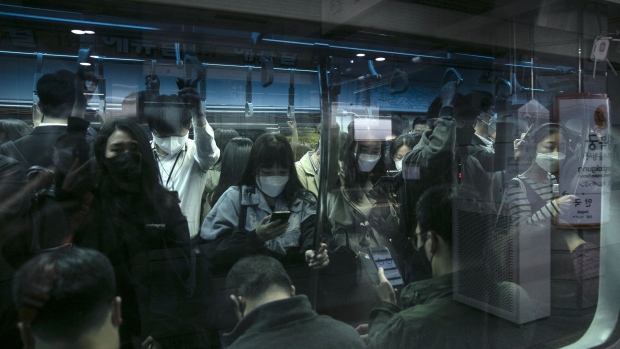Nov 29, 2022
South Korea Subway Workers Go On Strike for First Time Since 2016
, Bloomberg News

(Bloomberg) -- Workers at South Korea’s major subway operator went on strike for the first time since 2016, further straining a nation roiled by disruptions from a walkout by truckers.
Unionized staff at state-run Seoul Metro, which operates subways in the South Korean capital, stopped work on Wednesday morning, according to the Seoul Transit Corporation Labor Union. They’re demanding the government withdraw plans to shrink the workforce and instead hire more staff to improve safety.
The walkout comes as South Korea faces supply-chain turmoil caused by strikes by truck drivers. It adds to pressure on President Yoon Suk Yeol, who’s trying to keep the economy on track amid surging living costs and slowing exports.
The impact of the truckers’ strike is spreading, as more and more drivers join the protest. With the participation now of tank lorry drivers, the inventory for gasoline at local gas stations is running low, with just eight days remaining as of Tuesday, according to the energy ministry. Some 24 gas stations have already run out of gasoline or diesel, the ministry said.
Second round negotiations between the government and truckers broke down on Wednesday. The union demanded the transport minister join the talks and withdraw an order asking cement truck drivers to return to work, the union said. Transport Minister Won Hee-ryong made phone calls to several truck drivers to ask them to return to work, the ministry said in a statement, without elaborating.
See also: Korea Orders Cement Truckers to Work, Citing Economy Risk
The Seoul Metro union staged a demonstration in front of the city hall Wednesday, according to the union’s website. The Seoul Metropolitan Government however said subways will operate normally during rush hours, with about one in four services dropped during the day.
Typically, strikes by public transport workers cause limited disruptions because by law, a minimum workforce is guaranteed to provide what’s considered an essential service.
The Seoul city government hired 13,000 temporary workers to make up for the loss of staff, and deployed more public buses during rush hours. Subway trains will operate as usual during peak periods while operations will fall to around 72%, based on the number of trains running, at other times, the city government said in a statement.
Separately, unionized workers from Korea Railroad Corp. plan a nationwide walkout Dec. 2, demanding an expanded workforce, better pay and measures to improve employee safety. Strikes at the state transport firms come as Yoon’s administration pursues a major restructuring of public companies to lift efficiency.
“We’re struggling with a chronic and structural labor shortage, and the government’s restructuring policies are set to further downsize our workforce,” Kim Seonuk, a policy secretary at the Korean Railway Workers’ Union, said in an interview. “We have no choice but to go on strike to negotiate with the government.”
--With assistance from Shinhye Kang.
(Updates with detail on truckers’ strike in 5th paragraph.)
©2022 Bloomberg L.P.


